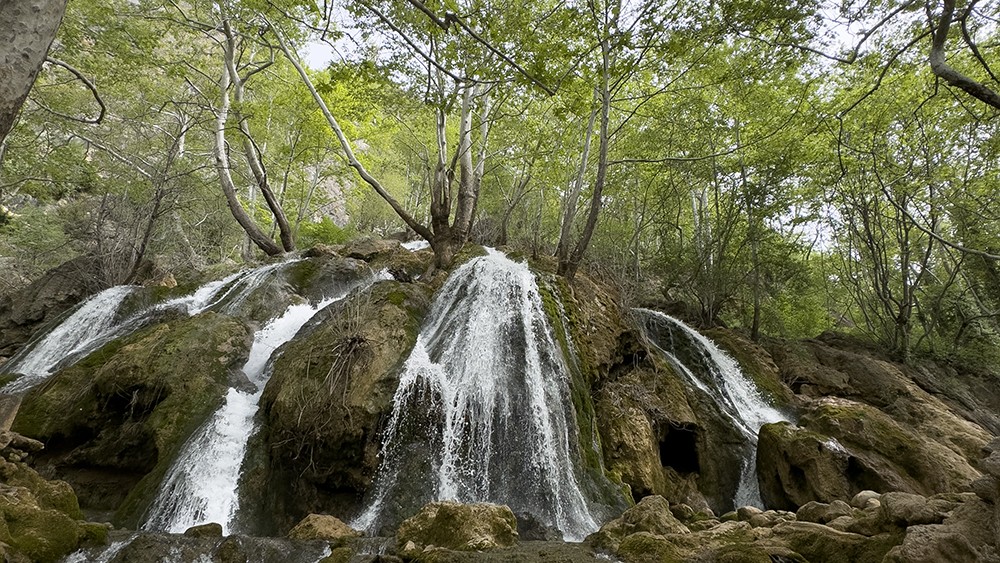

-
What Equipment Should You Use?
Hiking Boot
Trekking boots are designed with different features for short, medium, and long-distance hikes. Especially for long-distance hikes like Adanus Yolu, the boot should provide excellent ventilation. It should also offer ankle support and protection while being lightweight and flexible. Boots made from non-slip materials should be preferred, and those that can wick sweat and moisture while being waterproof enhance hiking comfort. In summer, boots made from Cordura fabric and suede leather are often the best options. In winter, waterproof, sturdy-soled, and treaded boots should be preferred.Backpack
The backpack is one of the most important pieces of equipment for hiking. Smaller backpacks are usually preferred in summer, while slightly larger ones are chosen in winter. Especially for long hikes, backpacks with a capacity of 60 liters or more should be used. The backpack should have special pockets for water bottles or canteens on the sides. When choosing a backpack, consider easy access to necessary items and practical use. Additionally, adjustable straps for the back, even weight distribution between the back and hips, and backpacks that provide lumbar support should be preferred. A quality backpack can last for years, so investing in one can lead to a more comfortable hiking experience.Trekking Poles
Using trekking poles not only prevents joint injuries but also helps distribute the load between the lower and upper parts of the body more evenly, allowing for more efficient energy use and longer periods of movement without fatigue.Rain Gear
The variable nature of Adanus Yolu creates diverse weather conditions. The possibility of rain should always be considered in spring, and necessary equipment should be prepared. In winter, where the likelihood of rain is high, wearing waterproof clothing and appropriate footwear is important. Additionally, accessing current weather information and planning your route accordingly can be beneficial.Headlamp
The importance of light is significant after setting up a tent, especially during night hikes. A headlamp, in particular, is practical as it allows you to use your hands freely, especially for night hikes. What's your preference, do you hike more during the day or at night?Camping Tent
Another essential equipment for trekking activities is camping tents. If you prefer camping during your activity, you should have a lightweight, waterproof, and easy-to-pack tent with you. This will enhance the quality of your hiking experience.Sleeping Mat
To improve the quality of your trekking activity, you should pay attention to the quality of your sleep at night. You should always create a layer between yourself and the ground, and the best way to do this is with a sleeping mat. The better the quality of your mat, the more comfortable you'll be. In addition to traditional mats, inflatable mats are also available.Sleeping Bag
Adanus Yolu consists of both sea-level paths and high-altitude areas. Even if you're on the southern shores, the temperature can vary significantly between forest and mountain air. A lightweight sleeping bag rated between -5 to 20 degrees Celsius or 0 to 15 degrees Celsius will provide you with confidence.First Aid Kit
Every backpack should contain necessary first aid materials. The most important items include an emergency first aid guidebook, bandages, iodine solution, aspirin, burn cream, pain relievers, scissors, safety pins, adhesive bandages, gauze pads, rubber bands for stopping bleeding, etc.Durable Pants
Likya Yolu consists of flat paths as well as areas with dense shrubbery. To prevent scratches on your legs, you should have quick-drying and practical pants, as well as shorts for flat paths. Additionally, having spare clothing for each day of your hike will always be advantageous. -
Things to Consider During a Hike
Absolutely do not start a fire! The majority of the area is covered with trees.
Take your trash with you and carry it to the next settlement's trash point.
Do not leave anything behind except your footprints.
Do not mark outside of the orange markings. You can create cairns (stacks of rocks) where you think it's necessary.
Carry enough water with you (at least 2 liters, more if you are camping).
Signs and trails in some areas may have been damaged due to natural causes, intentionally, or due to new road works. In these areas with very few hikers, you can use a GPS device or smartphones to follow coordinates to avoid getting lost
-
Things to Consider When Planning a Hike
The best time for hiking is during the cool, vibrant seasons of spring and autumn when the surroundings are colorful. The summer season is too hot for hiking in this area.
Prefer hiking in a team. An ideal team size is at least three people. It makes intervention easier in emergencies and ensures a more enjoyable experience.
Know yourself well! If you haven't done multi-day hikes before, test yourself on short trails in your area.
Know your partner well! If possible, go on at least a one-day hike or camp with your potential hiking partner beforehand. Knowing each other's habits will be very beneficial during long hikes!
Test your equipment! Make sure to test any new gear before hitting the trail. Using brand-new shoes on such a long route is a mistake. First, test your equipment on simpler hikes.
1 Comments
Gamze Demir Reply
Yolculuk yaparken yol üstünde tabelada gördük merak edip gittik çok beğendim gidip piknik yapılabilir oturma alanları çok fazla yok piknik için az ama o atmosferi oksijeni solumaya değer